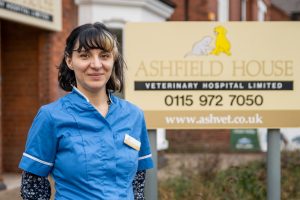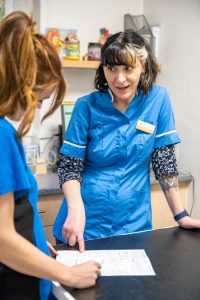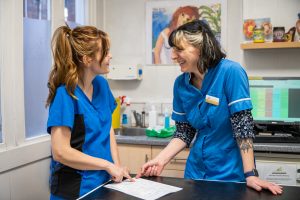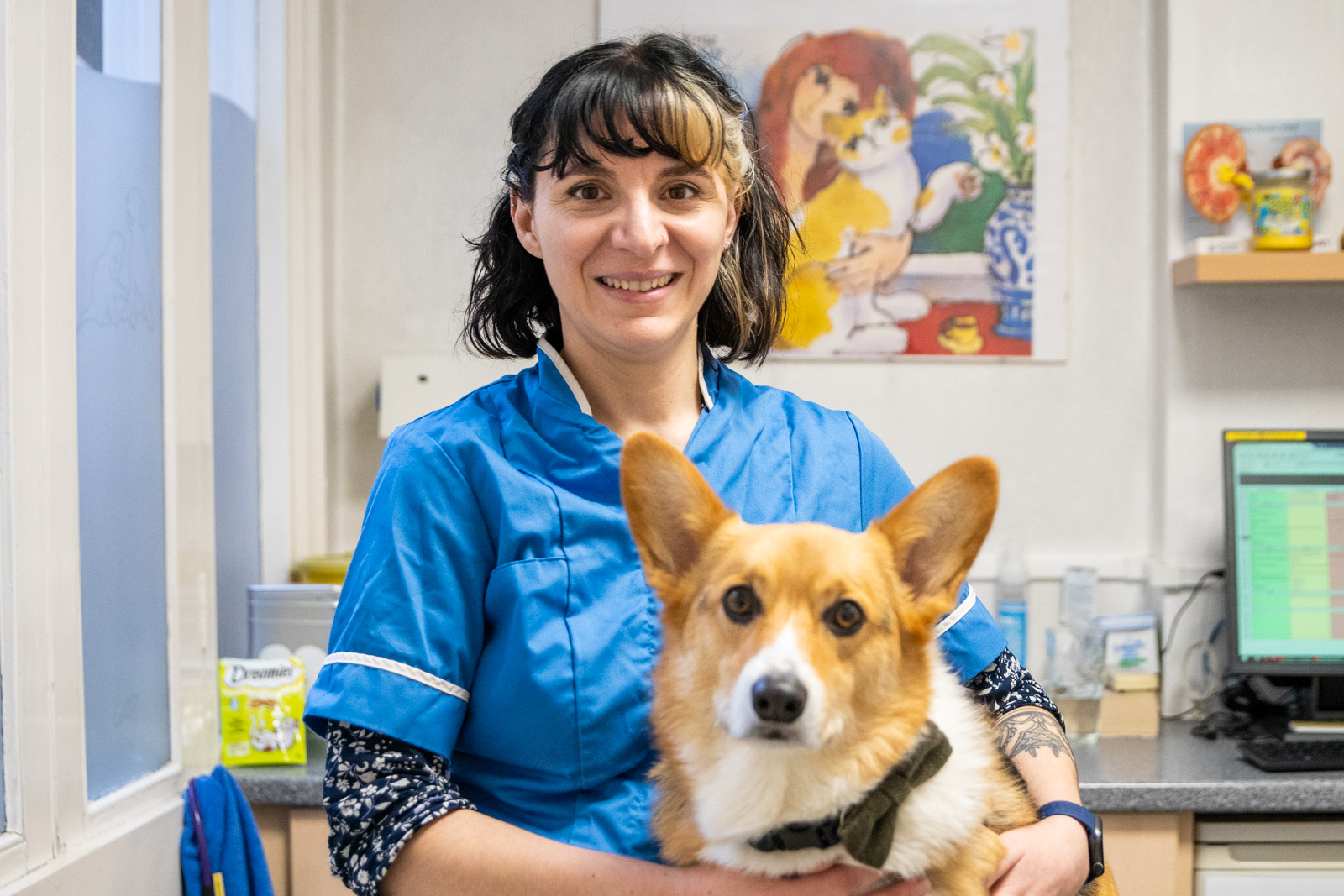For as long as she can remember, Ashfield House vet Paola Sponza has struggled with severe anxiety and depression and a feeling that she didn’t belong anywhere.
Then, last year, at the age of 38, she was finally diagnosed with attention deficit hyperactivity disorder (ADHD) and her life has been transformed for the better.
Here, Paola shares her inspirational journey and reveals how finding a supportive, caring workplace which embraces inclusion and diversity has turned her life around….
WHEN vet Paola Sponza was told by doctors she had ADHD, suddenly everything that had ever happened to her in life, and the way she had always felt about herself, made perfect sense.
Ever since she was a child, Paola had felt confused and alone, struggling to cope with acute anxiety, a lack of focus and concentration, and feeling incredibly vulnerable.
“I’ve never felt that I was good enough, and I always felt different to everyone else,” she says.
“Even when I was achieving success, I had imposter syndrome. I wasn’t able to cope with life as everything was chaotic, and I felt very isolated.”
Paola still vividly remembers her early struggles as a child growing up in North East Italy.
Looking back, she believes the signs of ADHD were always there but it was never picked up by anyone.
“At school, I was the pupil who always forgot their gym kit or books, and I would be lost inside my own little bubble,” she says.
 “I struggled to focus on what the teacher was saying in class, and on one occasion I lost control when I was shouted at by a teacher. I was so focused on her, because hyperfocus is a characteristic of ADHD, that I started sucking my thumb as I lost context of what was happening around me. She shouted at me about how I was far too old to suck my thumb but I wasn’t even aware I was doing it.
“I struggled to focus on what the teacher was saying in class, and on one occasion I lost control when I was shouted at by a teacher. I was so focused on her, because hyperfocus is a characteristic of ADHD, that I started sucking my thumb as I lost context of what was happening around me. She shouted at me about how I was far too old to suck my thumb but I wasn’t even aware I was doing it.
“After that episode I became good at hiding my flaws. The feelings of anxiety started when I was eight and I would vomit every morning before school. I struggled with anxiety all my life and feelings of vulnerability and not being able to cope.
“In Italy, mental health is not given such high consideration as it is in the UK so I had moments when I really struggled, but just had to carry on with life.”
Paola’s academic success masked her problems, although she had to extend her veterinary medicine degree at the University of Bologna by two years.
“I was managing to succeed in life, although people would say I was clever but lazy,” she says.
“Studying was difficult because I either couldn’t focus or I was too intensely focused. If something wasn’t interesting, I could read the same page six times and still not take in a single word, which was so frustrating.
“At university I was incredibly disorganised in every aspect of my life. The laundry was never done so I would have to go an buy new underwear and I wasn’t eating at set meal times, it would be whatever time of day.”
It took until the age of 38 when she was working at Ashfield Vets in Long Eaton, near Nottingham, after moving to the UK, for Paola to be finally diagnosed with ADHD.
NHS England estimates that 3% of the population have ADHD. It is characterised by three main features – inattention, hyperactivity and impulsivity – but some people may have just one of these features or a combination of two rather than all three.
Paola’s suspicions that she had ADHD reached a new level last summer while scrolling casually through Instagram and coming across a meme revealing characteristics of the condition.
“I laughed when I saw the characteristics, but something really resonated with me and I looked into it more closely,” she says.
“I’m very proud of what I am. It was important that I received a diagnosis not only for myself but for my daughter. If it was confirmed I had ADHD, it would mean I would be able to access support for her from an early stage in her life and she would not have to go through what I have. My diagnosis would put her on a more privileged pathway and she could have a better life than me.”
Getting a referral from her GP so she could get a diagnosis proved so difficult, with such a long waiting list, that Paola decided to go privately to see a psychologist.
 Last August, she finally received the diagnosis and the overwhelming relief of knowing was life transforming.
Last August, she finally received the diagnosis and the overwhelming relief of knowing was life transforming.
Paola admits the support of her colleagues at Ashfield House, and being part of a larger veterinary group that puts inclusivity and diversity at the heart of everything, has been a tremendous comfort while seeking the answers she was looking for.
“I feel accepted for who I am,” she says.
“I felt so comfortable telling everyone at the practice about my diagnosis because I knew it would not change their perception of me. They just wanted to know how I needed to be supported.
“The medication has a high rate of success so I decided to try it. It worked very well. My anxiety disappeared overnight. It was like a button had been switched off.
“I realised that the negative thoughts and the anxiety were not part of me, it was part of ADHD. Now I understand how to work around the negative aspect of ADHD and have coping mechanisms in place like writing everything down and setting reminders on my watch so I remember things.
 “Neurodiversity is enriching for practices and whatever workplace you are in you will have neurodiverse colleagues, whether they have ADHD, autism or dyslexia. There are lots of successful people with ADHD.
“Neurodiversity is enriching for practices and whatever workplace you are in you will have neurodiverse colleagues, whether they have ADHD, autism or dyslexia. There are lots of successful people with ADHD.
“I take a break between consults, one in the morning and one in the afternoon, so I am not too overwhelmed and sometimes I need noise cancelling headphone to focus, otherwise the ADHD doesn’t affect my work.
“I am in a truly happy place and the diagnosis has changed who I am in a positive way. I am still the same person I was but I am much more comfortable with that person because I received the answers I was looking for.
“Talking about my experience is very important to raise awareness. I can’t change my past but talking about neurodiversity may help others to receive an early diagnosis and access help earlier than me, as well as an understanding that neurodiversity is not a disability and it does not stop you having a successful life or career.”
As a young graduate, Paola was unable to be accepted for a PhD as her grades were not high enough due to her condition.
 Now, with funding and the support of VetPartners, she has enrolled to do a General Practitioner Certificate in Endoscopy and Endosurgery.
Now, with funding and the support of VetPartners, she has enrolled to do a General Practitioner Certificate in Endoscopy and Endosurgery.
“Previously, I never felt enough and I was scared to do a certificate but I now have the strategies to cope and too be able to study, so I feel confident,” she says.
“I was someone who struggled to take a degree and, according to statistics, should not have been able to have such a high level of education without support for my ADHD. So, at long last, I have started to feel like an achiever.”
- Paola was born in the North East of Italy, near the Slovenian border. She studied veterinary medicine in Bologna. After graduating in 2011, she worked for five years in the Bologna area before moving to the UK.
- Initially, she attended a language school, working in a B&B in Scarborough to ensure she could speak fluent English before joining a veterinary practice. At the end of the season, she found her first veterinary role in Leicester and then moved to Nuneaton. She joined Ashfield House and VetPartners in September 2021.
For media enquiries, please contact Amanda Little, VetPartners PR and Communications Director. Email amanda.little@vetpartners.co.uk

